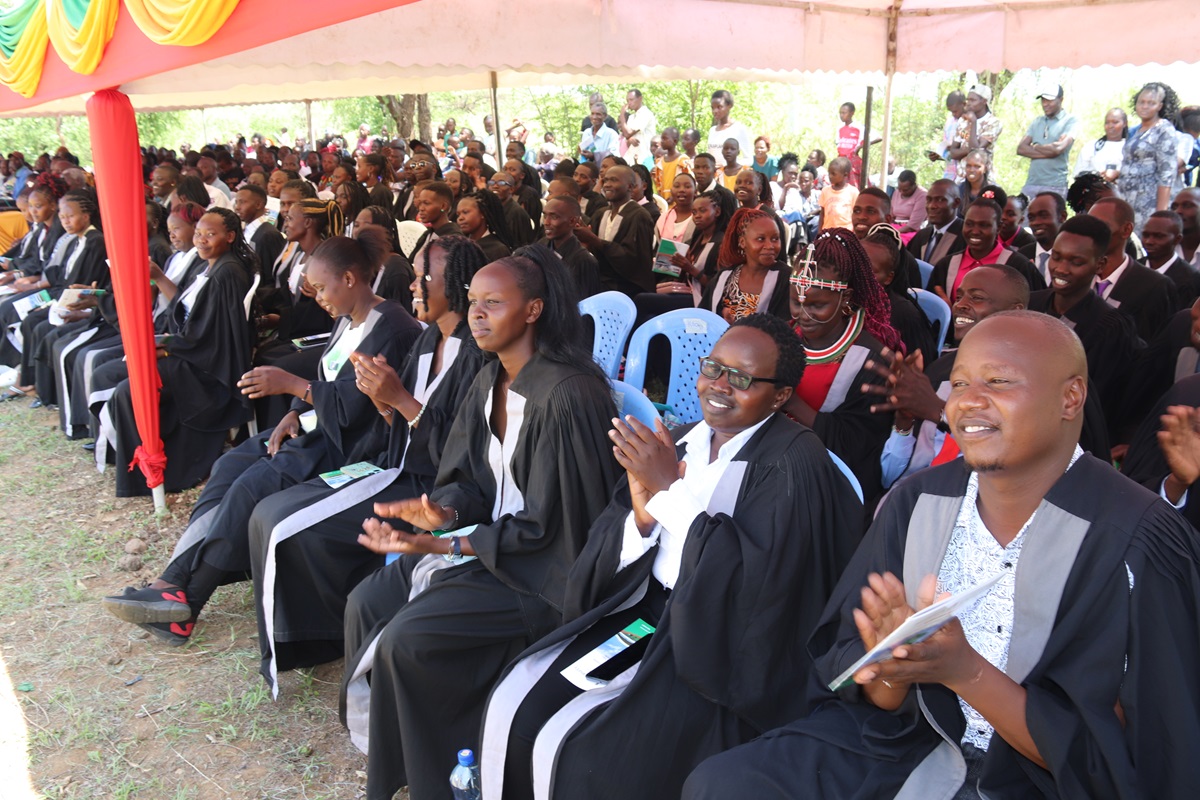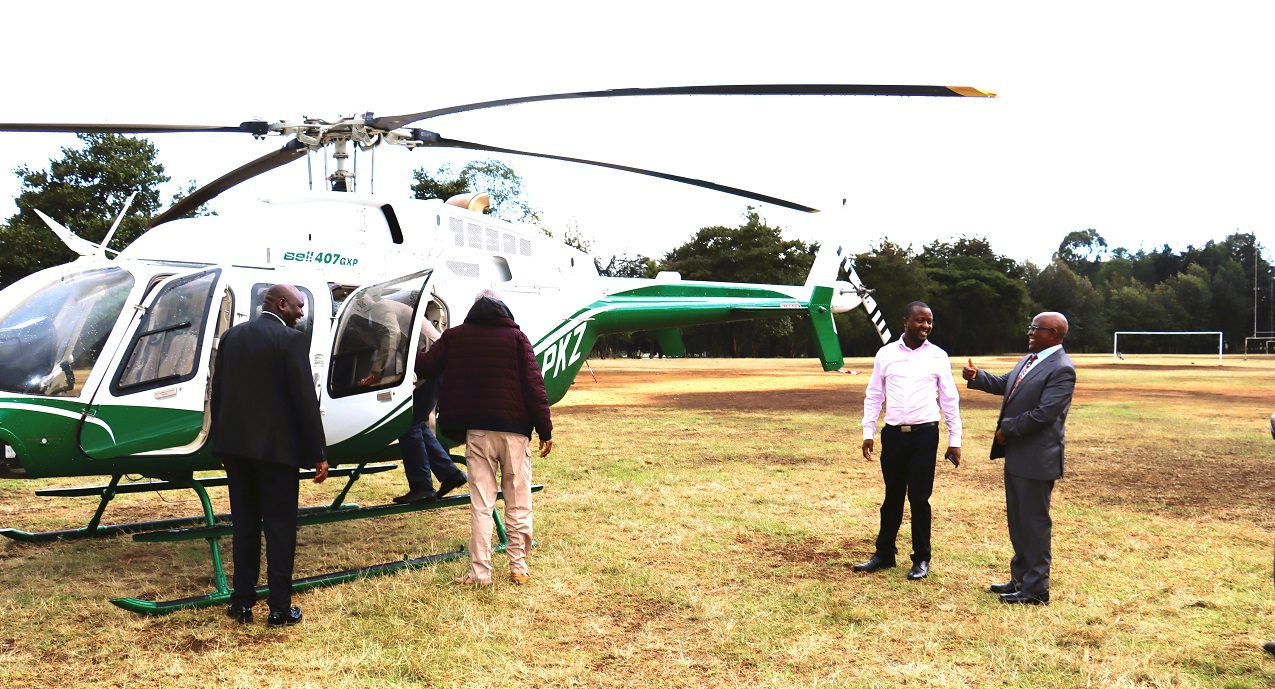In a significant move towards enhancing the digital tax system and promoting collaboration among government agencies, a high-profile delegation led by the Principal Secretary for Immigration and Citizen Services, Ambassador Professor Julius Bitok, accompanied by the E-Citizen Services Director General, Ambassador Isaac Ochien’g, and the Commissioner General for Kenya Revenue Authority (KRA), Humphrey Wattanga Mulongo, Tuesday paid a visit to Egerton University.
The delegation was received by the Vice Chancellor of Egerton University, Professor Isaac Kibwage, in his office, where they engaged in discussions encompassing various aspects affecting the university and the government's financial support. The meeting also delved into critical matters related to climate change, particularly the President's initiative to plant 15 billion trees. As a symbolic gesture, the visiting dignitaries plan to plant ceremonial trees to mark their visit to the university was disrupted by a heavy downpour.
During their meeting, Professor Kibwage extended an invitation to the three distinguished guests to participate in the "Universities Run For The Mau," an annual cross-country event aimed at raising awareness and resources for the university's tree-planting initiative. This initiative aligns with the broader national goal of combating climate change and safeguarding the environment.
Ambassador Professor Bitok expressed his gratitude to Professor Kibwage for hosting his delegation at the university's Agricultural Resource Centre (ARC) Hotel, the main reason he had visited to see the progress on the new E-Citizens platform system that is underway. He highlighted the critical role that the digital tax system plays in achieving the President's vision, emphasizing that the Executive Order Number 1 of 2023 has positioned E-Citizen under the Ministry of Interior. Ambassador Bitok informed the gathering that more than 11,000 services have been integrated into the platform, a substantial increase from the initial 390 services.
Furthermore, Ambassador Bitok underlined the President's directive to close all paybills associated with government agencies, centralizing payment through KRA to ensure greater efficiency and transparency. He expressed his optimism regarding the potential revenue collection growth, projecting an increase from the current Ksh. 1.5 trillion raised from government services to Ksh. 3 trillion, including other KRA collections and projects.
"The E-Citizen platform and the applications that we have developed are signature products that have the potential to revolutionize the Kenyan economy," Ambassador Bitok declared, suggesting that this innovation could even extend beyond the country's borders.
Humphrey Wattanga Mulongo, Commissioner General of Kenya Revenue Authority, echoed Ambassador Bitok's sentiments, assuring that the enhanced digital tax system would be accessible and beneficial to all. In his address, Mulongo emphasized the need to utilize the vast amount of data that KRA has at its disposal, which has previously been underutilized for making informed tax policy decisions. He also underscored the importance of breaking down silos within government agencies to facilitate data-driven decision-making and combat complacency, tax evasion, and corruption.
Mulongo elaborated on the comprehensive features of the digital tax system, emphasizing its potential to expand the tax base, even to small-scale businesses and individuals. The system encourages consumers to request and verify receipts for their purchases, ensuring that taxes are properly remitted to the Kenya Revenue Authority. QR code scanning will enable easy verification of the authenticity of these receipts.
However, both Ambassador Bitok and Commissioner General Mulongo stressed the need to address the issue of cash transactions that bypass the digital tax system, as some government agencies and individuals continue to evade taxes through this method.
The delegation was also provided with an overview of the new system's status, which is scheduled for rollout in February of the following year after successful trials and testing. Various teams, including the data analytics team, TIMS Soma Invoice team, and iTax team, showcased the system's additional features, underscoring its potential to transform the tax collection process and enhance transparency.
To conclude the visit, Egerton University's Director of Marketing and Resource Mobilization, Prof. Paul Kimurto, accompanied by Nakuru Town Campus Principal, Prof. Joshua Ogendo, took the guests on a tour of the university from the University sports pavilion, where they arrived via a helicopter. The delegation was briefed on potential areas of collaboration and opportunities for partnership with the university.
An attempt was made to plant trees as a symbolic gesture towards environmental conservation, but the proceedings were disrupted by a heavy downpour, highlighting the need for concerted efforts to combat climate change.
Vice Chancellor Professor Kibwage bid farewell to the distinguished visitors at the sports pavilion after their insightful visit. He expressed optimism that the enhanced digital tax system would facilitate government institutions like Egerton University in meeting their tax obligations with minimal difficulty, and contribute to the nation's broader goals of sustainability, environmental conservation, and economic development.
The visit to Egerton University served as an important milestone in the government's efforts to strengthen its digital tax system and commitment to combating climate change, highlighting the collaborative spirit between government agencies and educational institutions in Kenya.
Written: Kurian Musa
Communications Officer
Edited by: Professor Paul Kimurto
Director, Marketing and Resource Mobilization
Directorate of Marketing and Resource Mobilization
Egerton University.
Email: This email address is being protected from spambots. You need JavaScript enabled to view it.












